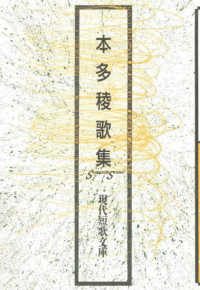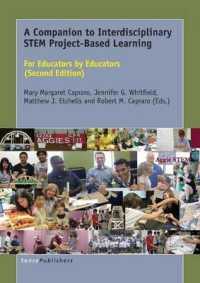- ホーム
- > 洋書
Full Description
Surgical Education: Theorising an Emerging Domain delineates surgical (as opposed to medical) education as a new and emerging field of academic enquiry. This reflects profound changes in healthcare training and practice on an international basis. As such, this book introduces, examines and explores the contribution of selected concepts and theories to surgical learning and practice. The first four chapters consider core facets of surgical education, such as simulation, while subsequent chapters take a key idea, often well known in another field, and examine its relevance to surgical education.
Of course, performing invasive procedures is no longer the exclusive preserve of 'traditional' surgeons. Boundaries between surgery and the interventional specialties (radiology, cardiology, intensive care) are becoming increasingly blurred, especially as technology continues to expand. Changing work patterns and explosive technological development mark this out as a major growth area. New educational approaches (e.g. the use of simulation) are emerging. And all clinical practice is a team activity, where clinicians from many specialties (medicine, nursing, allied professions) come together with shared goals. For all the above groups, and their patients, education (teaching, training, learning and assessment) is of crucial importance.
Yet the unique characteristics of surgical education have not previously been addressed from an educational perspective, nor have its possibilities as a new research domain been mapped. The domain needs to be theorised and its epistemological foundations established. There is thus both a need and a market for a definitive work in this area, aimed at surgeons, other clinicians, non-clinicians, educators, and others interested in this new domain.
Contents
1. The environment of surgical education and training: Roger Kneebone and Heather Fry.- 2. Educational ideas and surgical education: Heather Fry.- 3. Simulation: Roger Kneebone.- 4. Researching surgical education: Heather Fry, Nick Sevdalis, Roger Kneebone.- Part 2.- 5. Conceptualising surgical education assessment: Lambert W.T. Schuwirth and Cees P.M. van der Vleuten.- 6. The scalpel and the 'mask': threshold concepts and surgical education: Ray Land and Jan H.F. Meyer.- 7. The surgeon's expertise: K Anders Ericsson.- 8. Current and future simulation and learning technologies: Fernando Bello and Harry Brenton.- 9. The role of patients: Debra Nestel and Linda Bentley.- 10. Self-monitoring in surgical practice: slowing down when you should: Carol- Anne Moulton and Ron Epstein.- 11. Learning and identity in the professional world of the surgeon: Alan Bleakley.- 12. Beyond 'communication skills': research in team communication and implications for surgical education: Lorelei Lingard.- 13. Surgical education: perspectives on learning, teaching and research: Gunther Kress.- Afterword: Roger Kneebone and Heather Fry.








